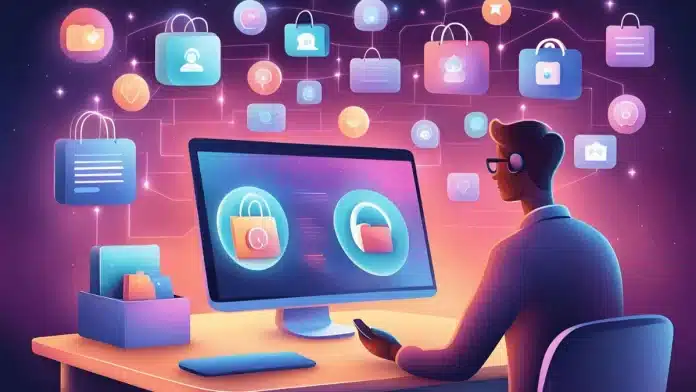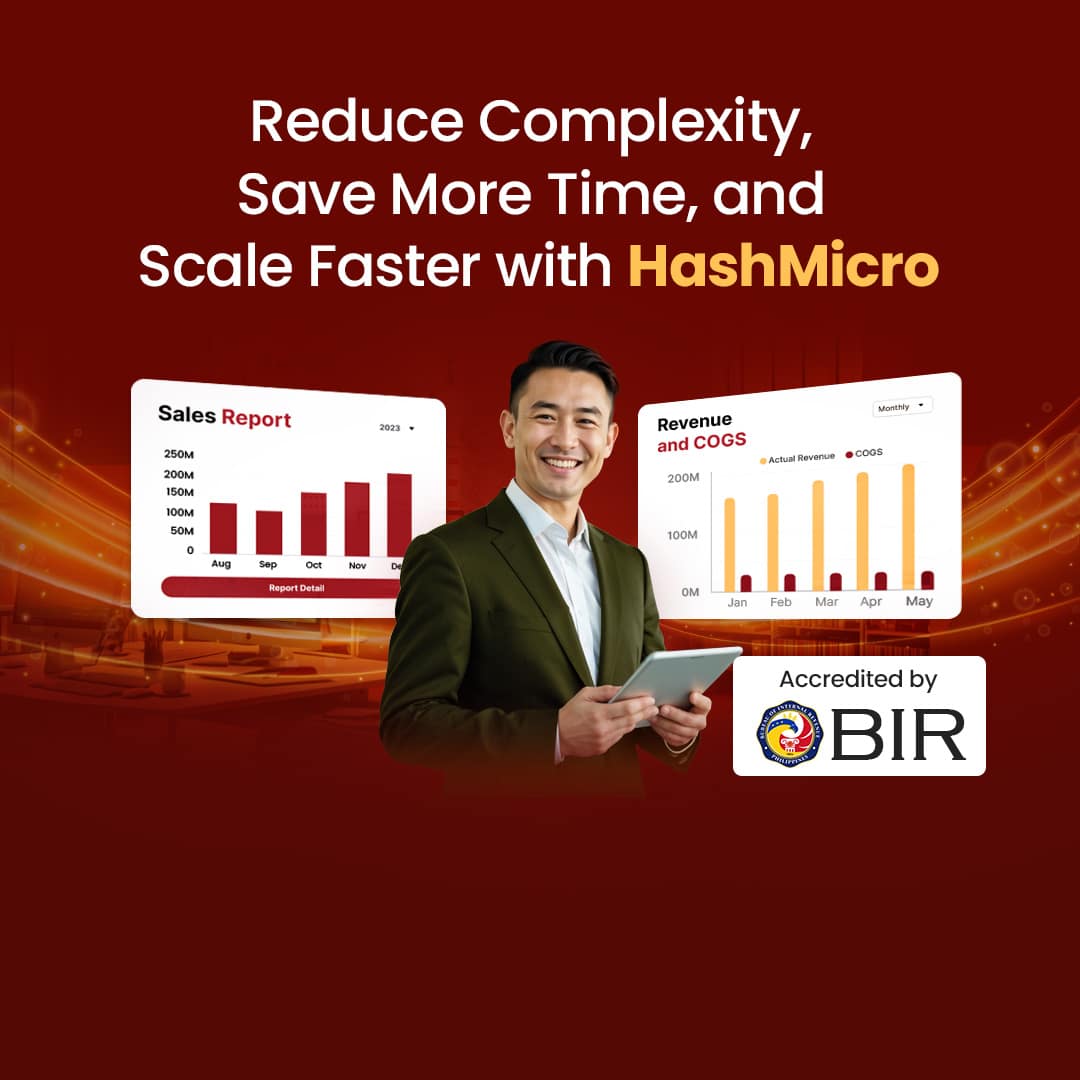Running a retail business can be exhausting. From managing inventory to meeting customer expectations, the challenges seem endless. Customers want personalized experiences, but how can you deliver perfectly? That’s where retail CRM software comes in.
Tinutulungan ka nitong i-manage ang customer relationships, track sales, at i-automate ang tasks, you more time to grow your business.
But which one is the best CRM for retail? Too many choices, so confusing! But worry not, HashMicro CRM is the most suitable software to fulfill every process and requirements of retail stores.
However, if you’re researching to compare more CRM options in the Philippines, we also provide other 14 recommendations, complete with features, strengths, and weaknesses.
Key Takeaways
|
Table of Content
Content Lists
What is Retail CRM Software?
A retail CRM is a tool designed to help retail businesses manage their unique challenges and take advantage of new opportunities. It’s especially useful for businesses that deal with frequent, repeat purchases in a business-to-consumer (B2C) setup.
With a retail CRM, businesses can improve sales, strengthen marketing efforts, and offer better customer service. How? By providing insights into what customers want and how they behave. This allows retailers to create personalized experiences, send targeted promotions, and offer excellent support.
For example, a CRM software can identify the perfect time to send a special offer based on a customer’s past purchases or browsing habits.
On top of that, retail CRM software automates repetitive tasks, saving time and effort. A report by McKinsey even found that up to 40% of retail tasks can be automated with tools like CRM.
Benefits of Retail CRM Software
A retail CRM ay hindi lang basta tool; it’s a game-changer for managing customers, improving experiences, and driving growth. Let’s take a closer look at what makes it indispensable:
1. Personalization
Customers expect more than generic interactions, and a good CRM helps you deliver. With the data it collects, you can craft highly personalized campaigns that speak directly to your customers’ needs and interests.
Big names like Netflix and Amazon thrive because they make personalization a priority, keeping customers engaged and loyal.
2. Improved Customer Service
Great customer service isn’t optional; it’s a dealbreaker. A CRM makes sure every inquiry is tracked and addressed, whether it’s a question, complaint, or request. Forget dropped emails or missed follow-ups, everything is centralized and organized.
Furthermore, satisfied customers are likely to spread the word, while one bad experience could send them running to your competitors.
3. Contact Management and Segmentation
Your CRM is like a one-stop shop for all customer information. It not only keeps everything in one place but also lets you organize your audience into segments. Whether you’re targeting new prospects or longtime buyers, segmentation helps you create campaigns that actually connect.
In fact, segmented email campaigns lead to more clicks, higher engagement, and fewer unsubscribes.
4. Increased Customer Retention
Happy customers keep coming back, and retention is where CRMs shine. With insights into your customers’ journeys, you can tailor experiences that make them feel valued. It’s a win-win: they get a personalized experience, and you get their loyalty.
5. Automated Customer Communication
Communication is key, but who has time to send every email or text manually? CRMs take care of this with automation. From welcome emails to appointment reminders, everything is sent at just the right time.
Internally, it also keeps teams on the same page by centralizing information, so no one is scrambling for details when it matters most.
6. Inventory Management
For retailers, inventory management is just as important as customer service. A CRM that integrates with inventory systems gives you real-time updates on stock levels, so you can answer questions like “Is this product still available?” on the spot.
It also reduces manual data entry, making processes smoother for your team and better for your customers.
With these benefits, a retail CRM isn’t just a nice-to-have—it’s an essential tool for any business that wants to grow, keep customers happy, and stay ahead of the competition.
15 Best Retail CRM Software in the Philippines
Finding the right retail CRM software can help businesses enhance customer relationships at mag-boost ng sales. Here are the top 15 retail CRM software in the Philippines for boosting communication and complete customer database:
1. HashMicro Retail CRM Software
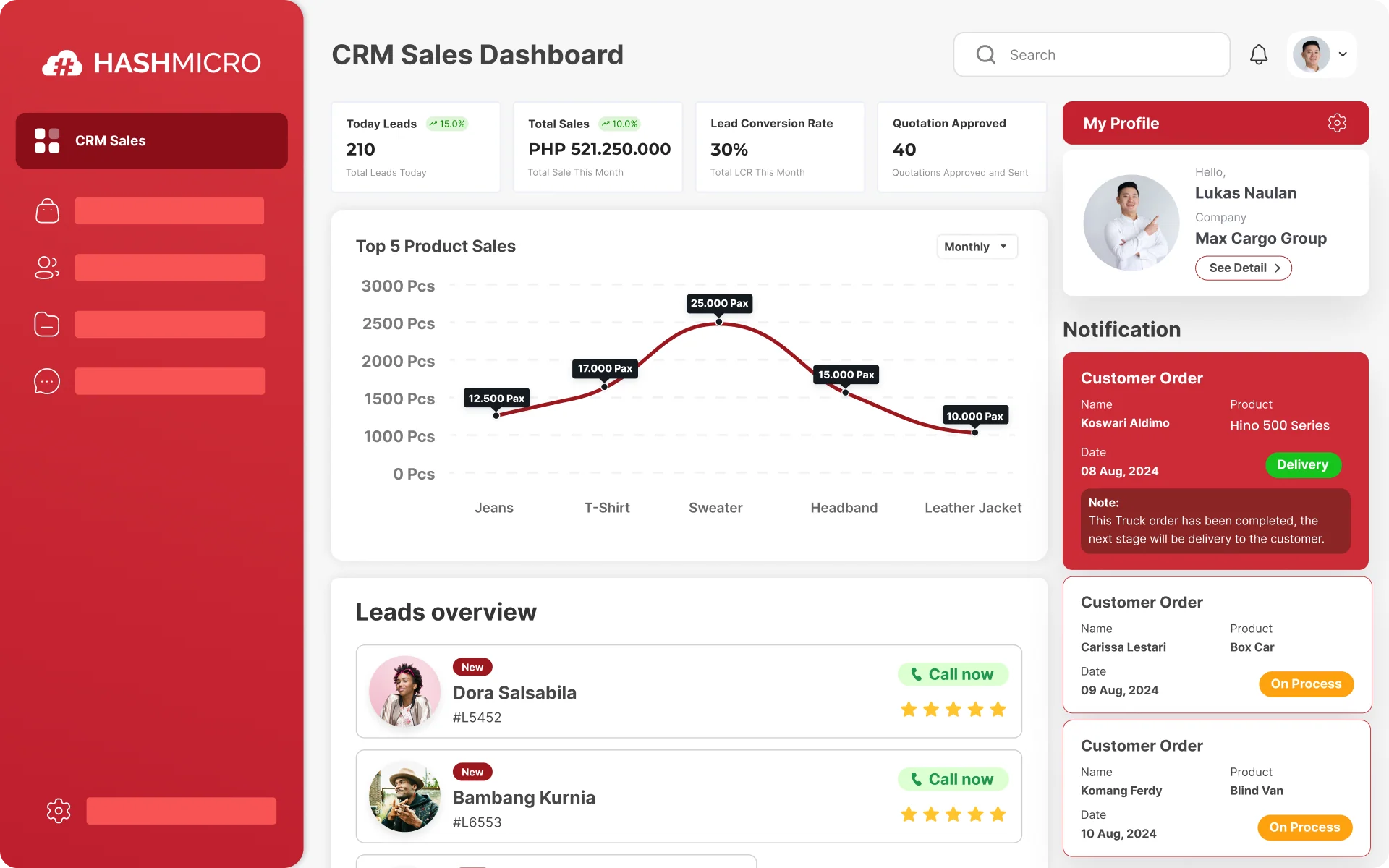
HashMicro CRM Software is a versatile, web-based solution designed for businesses across industries, including retail, consulting, real estate, and more. It helps simplify tasks and ensures your customer data is always accurate and accessible.
Curious how HashMicro CRM can transform your operations? Subukan mo ang free demo para makita kung paano nito kayang i-boost ang business processes at customer engagement strategies mo.
HashMicro is different in its seamless integration with other essential business modules like accounting, procurement, and inventory. Sa tulong ng integration na ito, madali mong ma-optimize ang end-to-end operations ng iyong negosyo.
Features:
- Sales Forecast & Actualization: Analyze historical data and market trends to predict sales and compare them with actual results.
- Customer Segment (RFM) Analysis: Group customers based on recency, frequency, and monetary value to target high-value segments effectively.
- Integration with Lazada, and Shopee: Synchronize orders, stock updates, and sales data across top e-commerce platforms seamlessly.
- Upselling Recommendations: Suggest complementary products for bundling or upselling based on customer purchase history.
- Customer Portal: Provide customers with direct access to update details, view data, and communicate with sales teams.
- Sales Loyalty Management: Track and reward customer purchases with loyalty points to encourage repeat business and retention.
| Pros | Cons |
|
|
Curious about the pricing plan of HashMicro? Click on the banner below to get your personalized pricing quote, perfectly suited to your requirements!

2. Salesmate
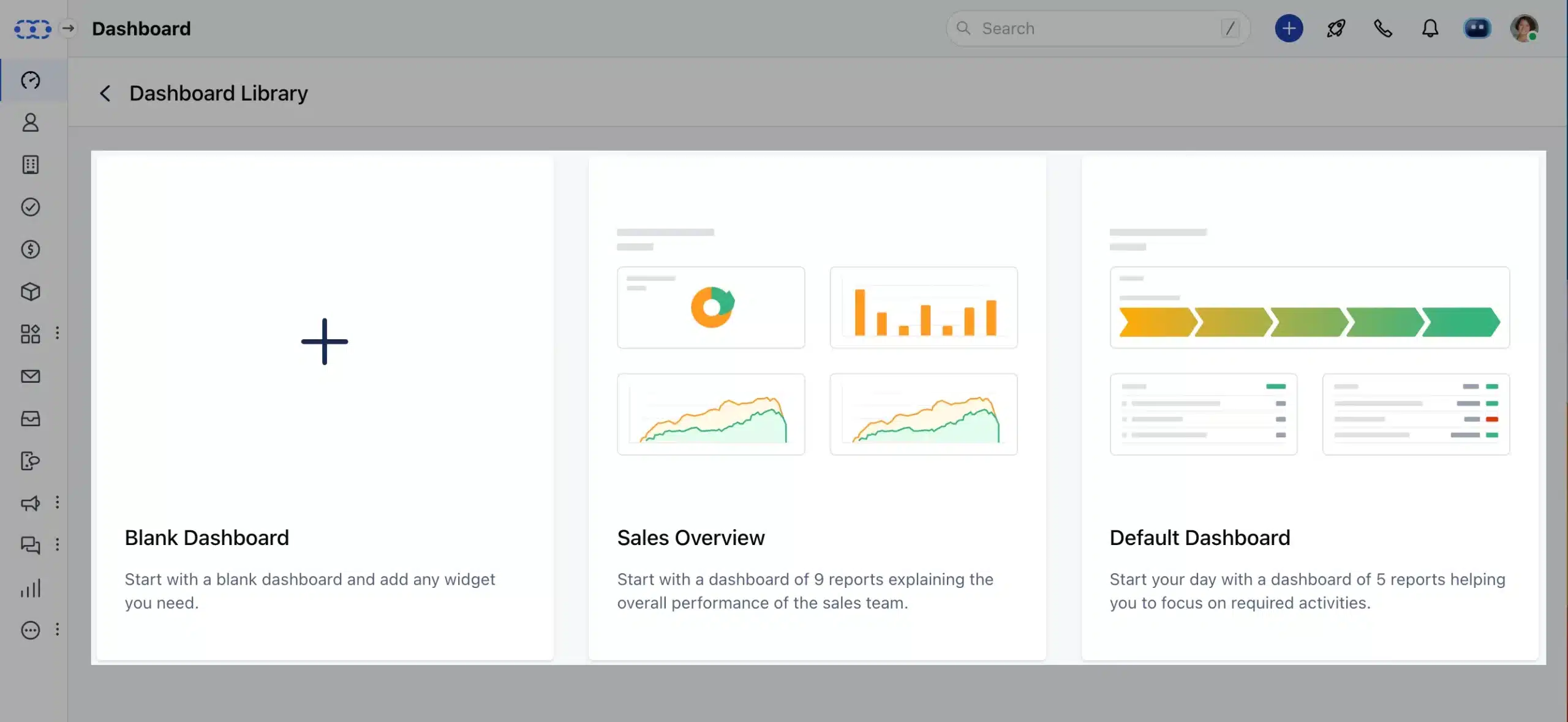
Salesmate is a versatile CRM for retail businesses, whether online or physical stores. With its automation-driven capabilities, it helps manage retail sales efficiently and improve overall workflows.
Features:
- Contact Management
- Lead management
- Sales pipeline management
- Team inbox
| Pros | Cons |
|
|
3. HubSpot Retail CRM Solution
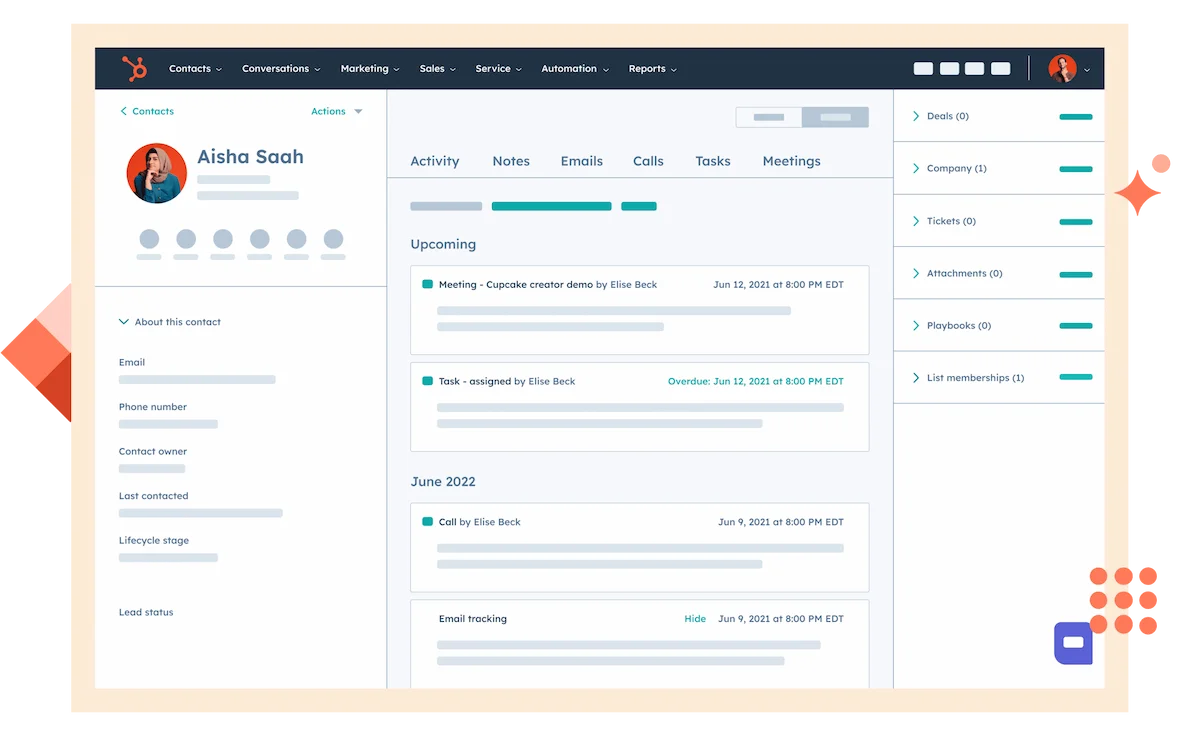
HubSpot is an all-in-one retail CRM that gives retailers the tools they need to build better customer relationships and boost sales efficiency. With its easy-to-use interface, HubSpot brings sales, marketing, and customer service together in one place.
These features help retailers simplify their daily operations and make smarter, data-driven decisions. Here are some of its key features.
Features:
- Contact management
- Daily dashboard
- Sales deal stages
- Automated data capture
| Pros | Cons |
|
|
4. Salesforce CRM for Retail
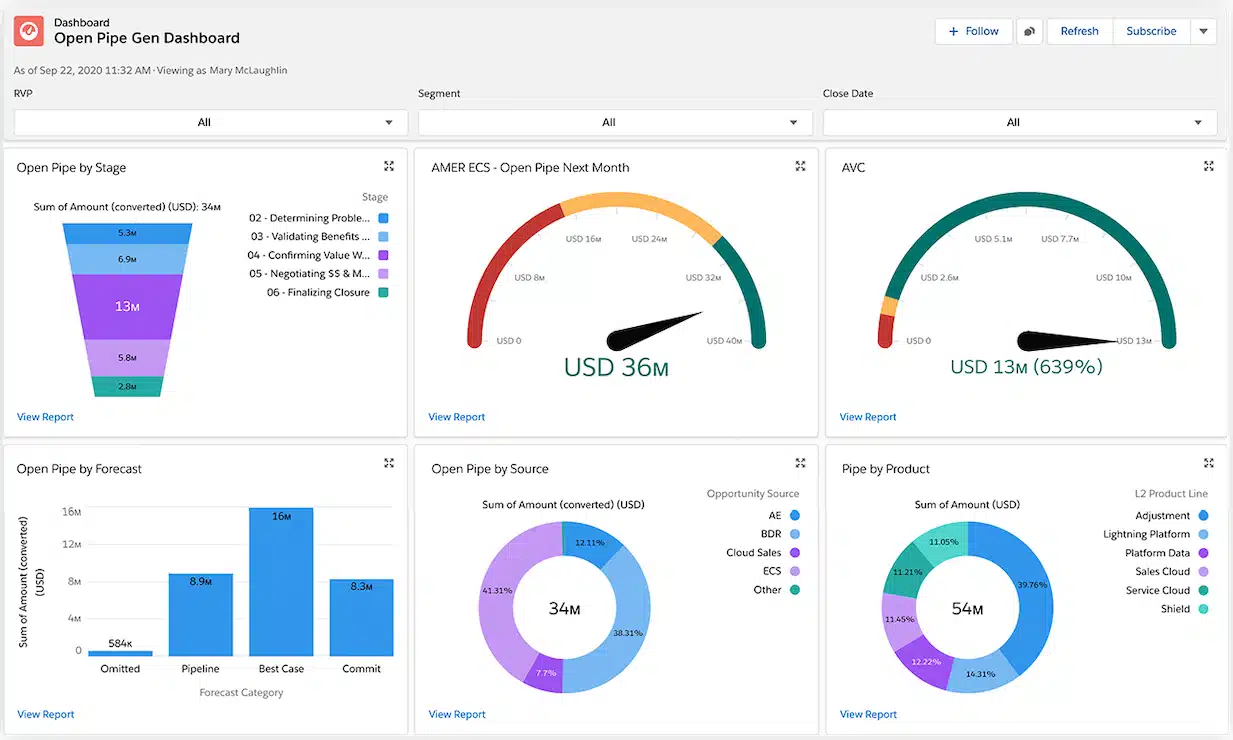
Salesforce is a powerful CRM for retail, which helps them to grow across all departments. With built-in automation and AI capabilities, it simplifies operations and improves efficiency.
One of its standout features is its seamless omnichannel integration, which connects online and offline sales channels to manage customer interactions effortlessly.
Features:
- Sales process tracking
- Centralized data
- Project management
- Contact management
| Pros | Cons |
|
|
5. Pipedrive Retail CRM Software
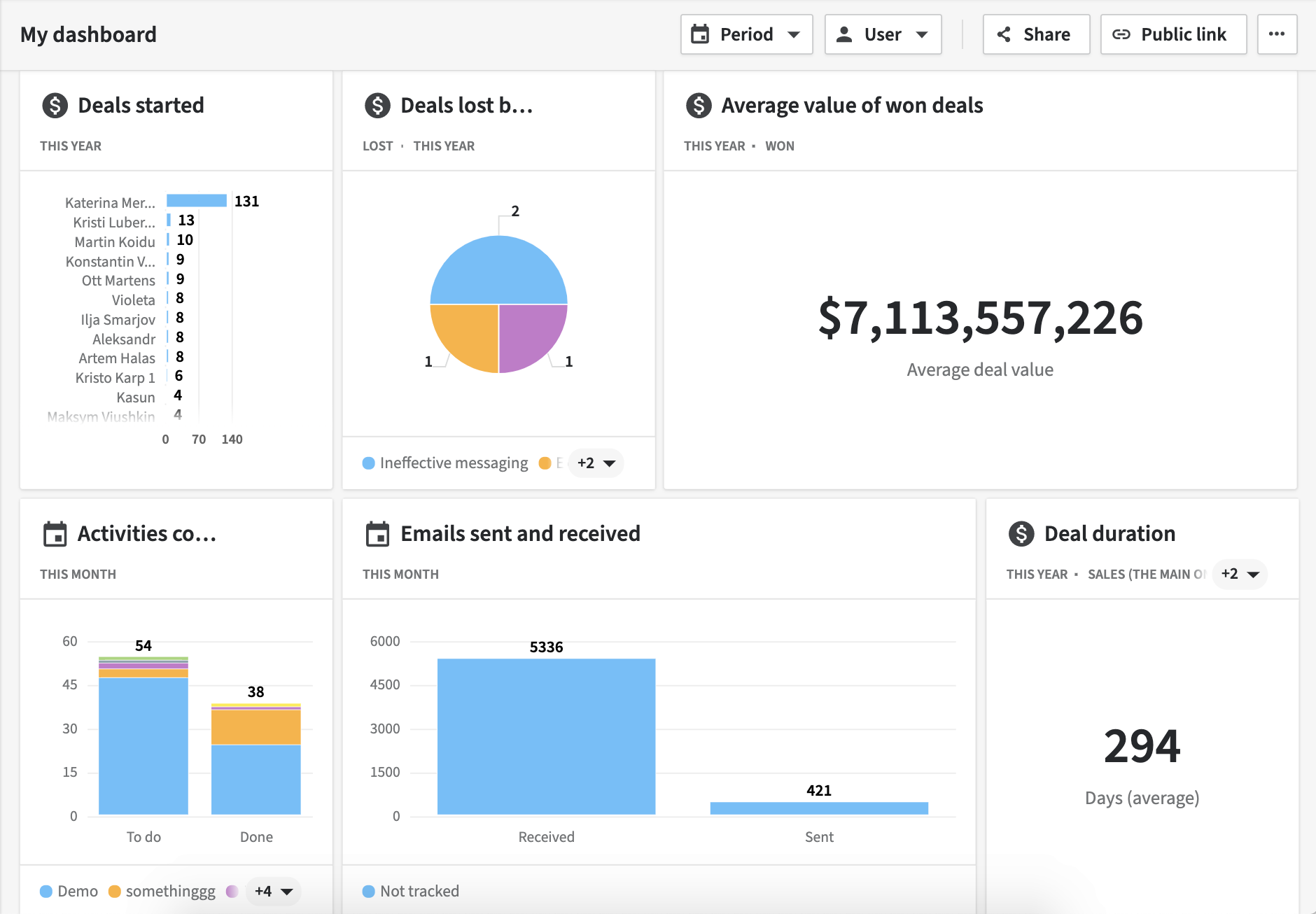
Pipedrive is an excellent retail CRM software for businesses, known for its user-friendly interface and focus on managing sales pipelines. It allows retailers to easily track their sales processes visually, ensuring no opportunity is missed.
Designed for the fast-paced retail industry, Pipedrive helps handle high volumes of customer interactions by simplifying lead tracking and deal management. Here are its standout features:
Features:
- Sales pipeline management
- Deal tracking
- Workflow automation
- Customizable dashboards
| Pros | Cons |
|
|
6. Freshsales Retail CRM System
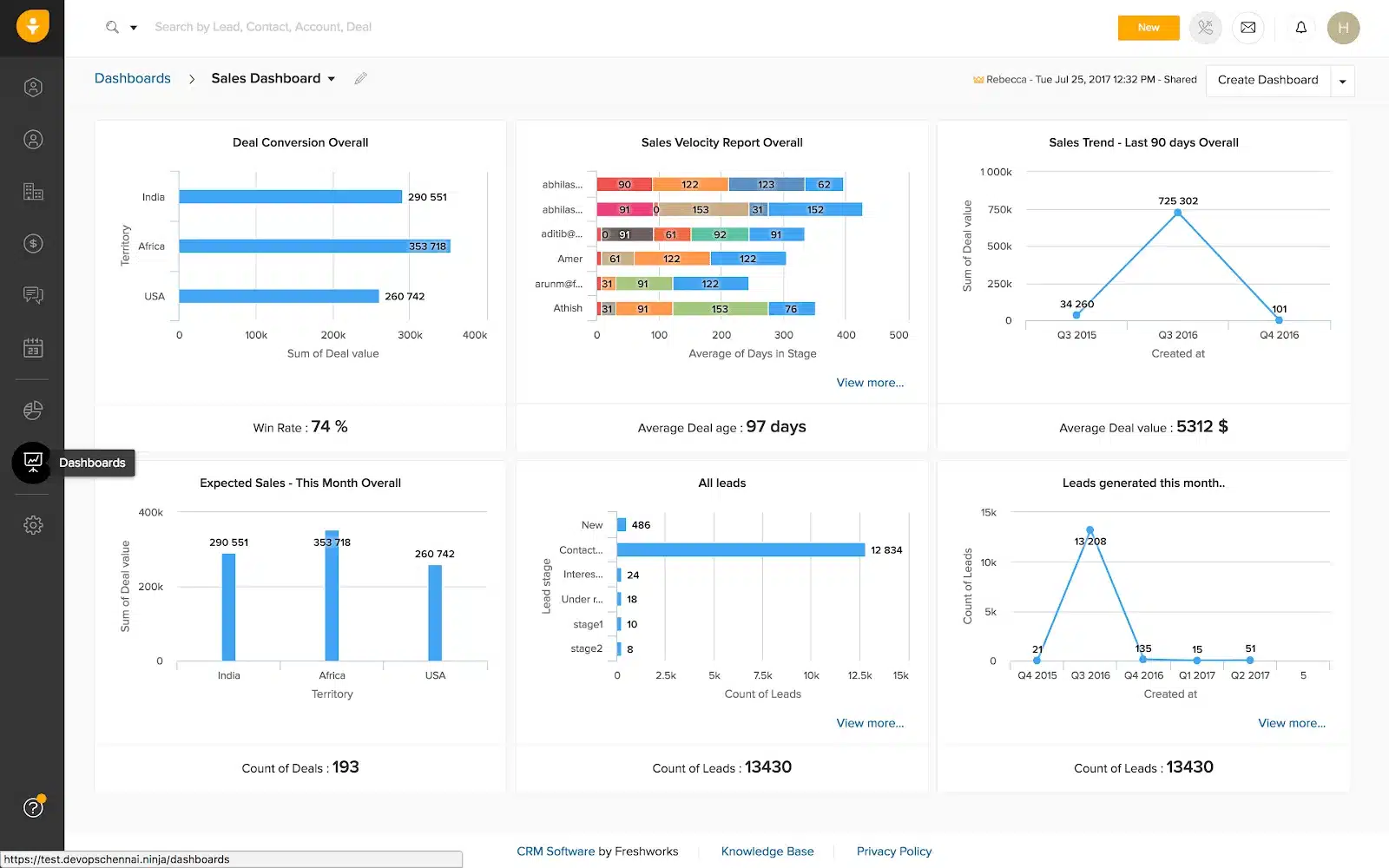
Freshsales is one of the best CRM for retail that provides all the tools retailers need to manage customer relationships and simplify sales processes. It’s especially great at automating tasks like email marketing and sales follow-ups, making it easier to handle large sales volumes.
Features:
- AI-powered lead scoring
- Chat campaigns
- Sales sequences
- Custom dashboards and reports
| Pros | Cons |
|
|
7. Bigin by Zoho
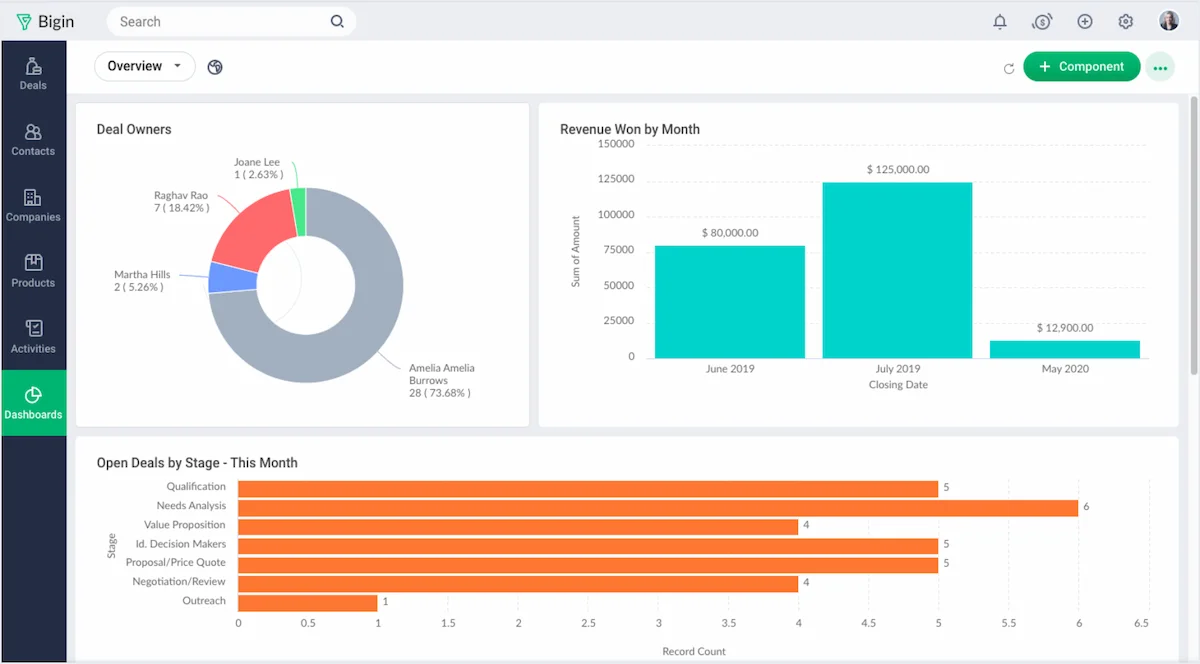
Bigin by Zoho is a great retail CRM software for small businesses looking for an affordable and straightforward way to manage customer relationships. It features user-friendly sales pipeline management, making it easy to monitor sales activities and customer interactions.
Features:
- Pipeline management
- Record management
- Automation tools
- Instant workflows
| Pros | Cons |
|
|
8. Zendesk Sell Retail CRM Software
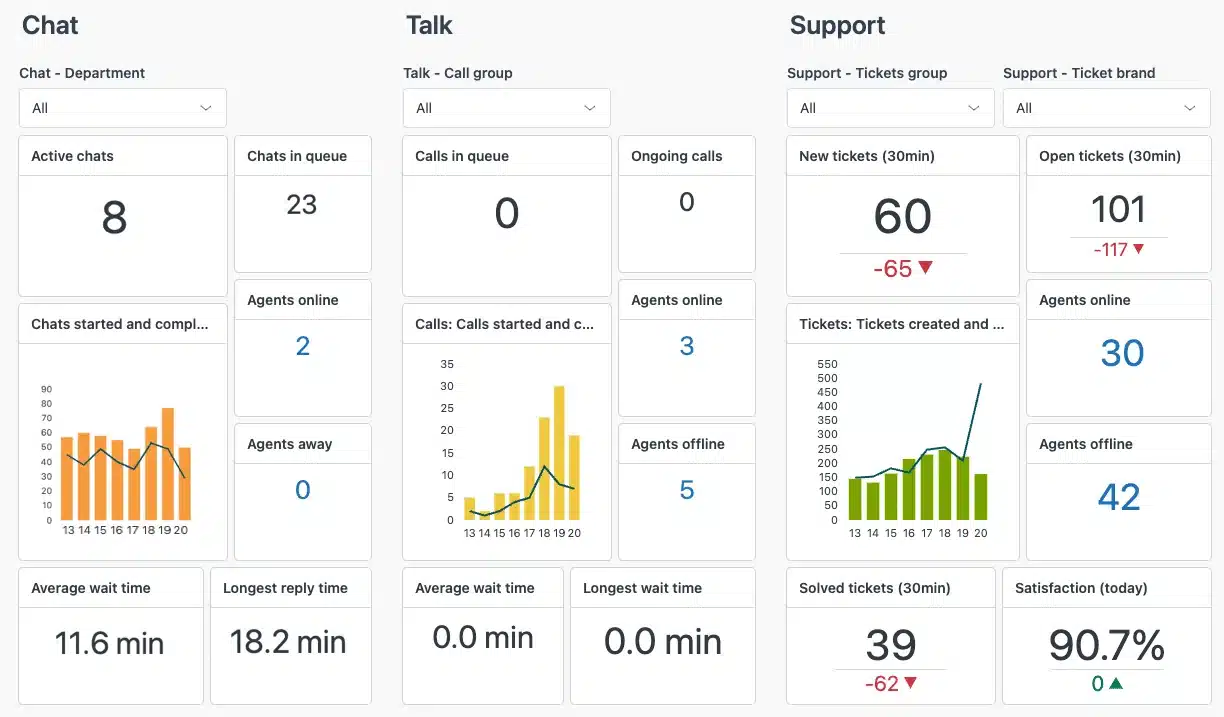
Zendesk Sell is a powerful CRM software for large retail businesses or companies with multi-channel sales needs. It features advanced sales pipeline management, real-time data tracking, and customer insights to help businesses stay on top of their operations.
Features:
- Customer support ticketing
- Multi-channel support
- Analytics and reporting
- Integration with other tools
| Pros | Cons |
|
|
9. Copper CRM for Retail Business
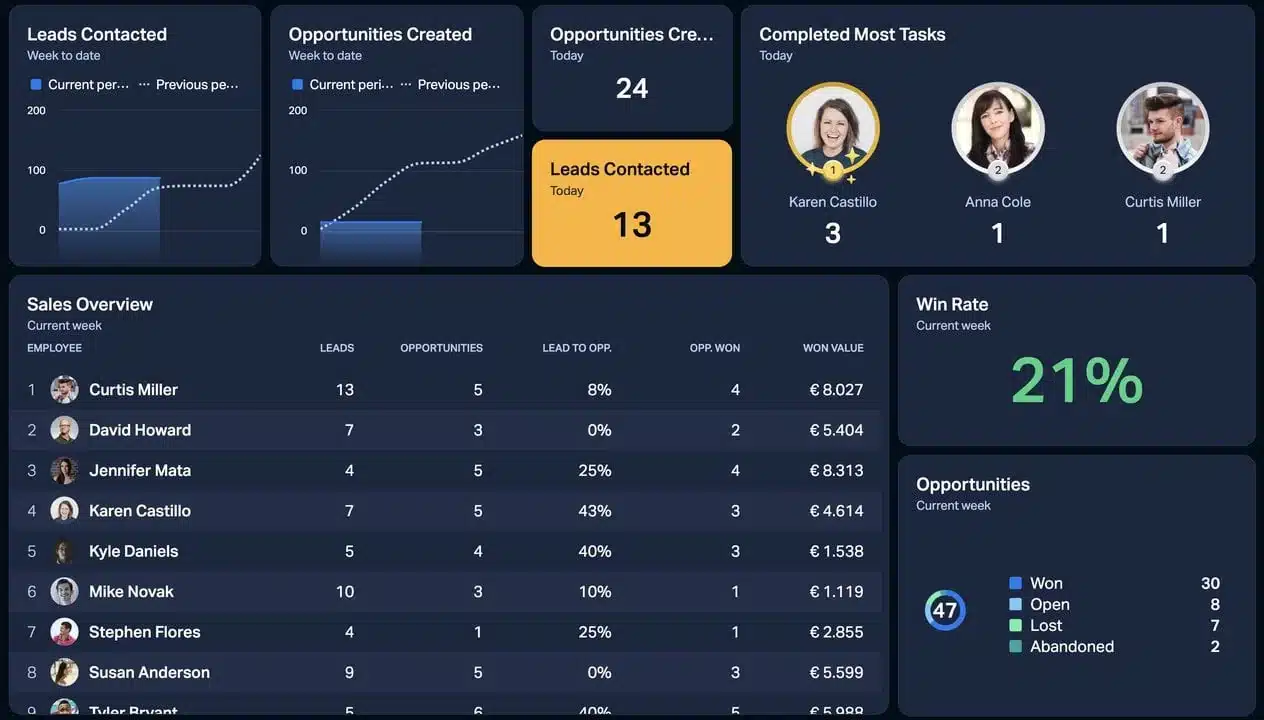
Copper CRM is a popular choice for retail stores, especially those that use Google Workspace. It integrates seamlessly with tools like Gmail, Google Calendar, and other Google apps, allowing retailers to manage customers right from their inbox.
Features:
- Contact management
- Email tracking
- Calendar integration
- Task management
| Pros | Cons |
|
|
10. Monday
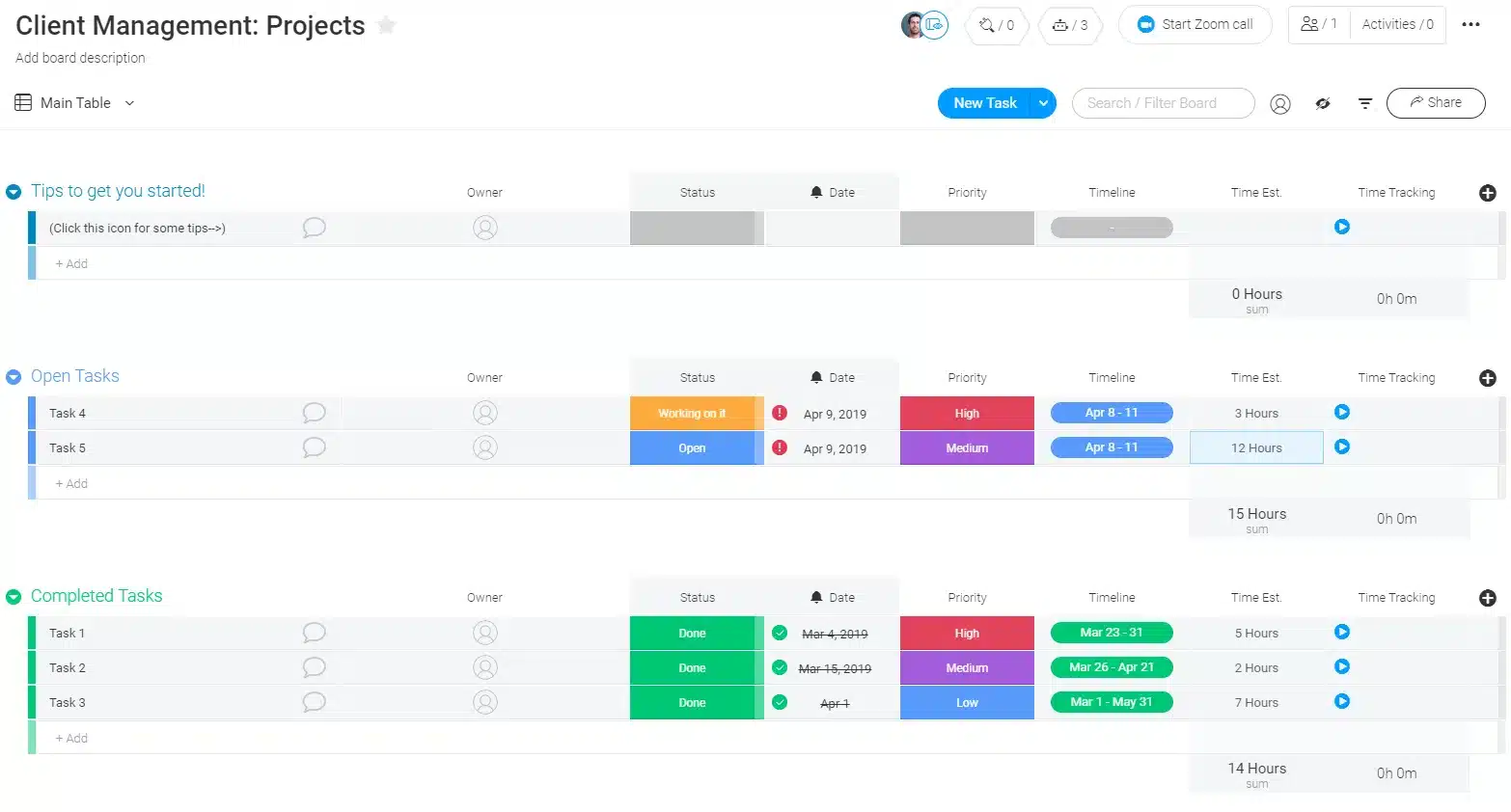
Monday CRM is a versatile retail CRM solution that stands out for its flexibility and customization options. It provides tools tailored to various roles, including business leaders, teams, account managers, IT, and operations.
While it’s not a typical CRM, its strong project management capabilities and automation features make it a great choice for retailers looking to improve operations and manage customer relationships effectively.
Features:
- Project management
- Task management
- Collaboration tools
- Custom workflows
| Pros | Cons |
|
|
11. Insightly Retail CRM Software
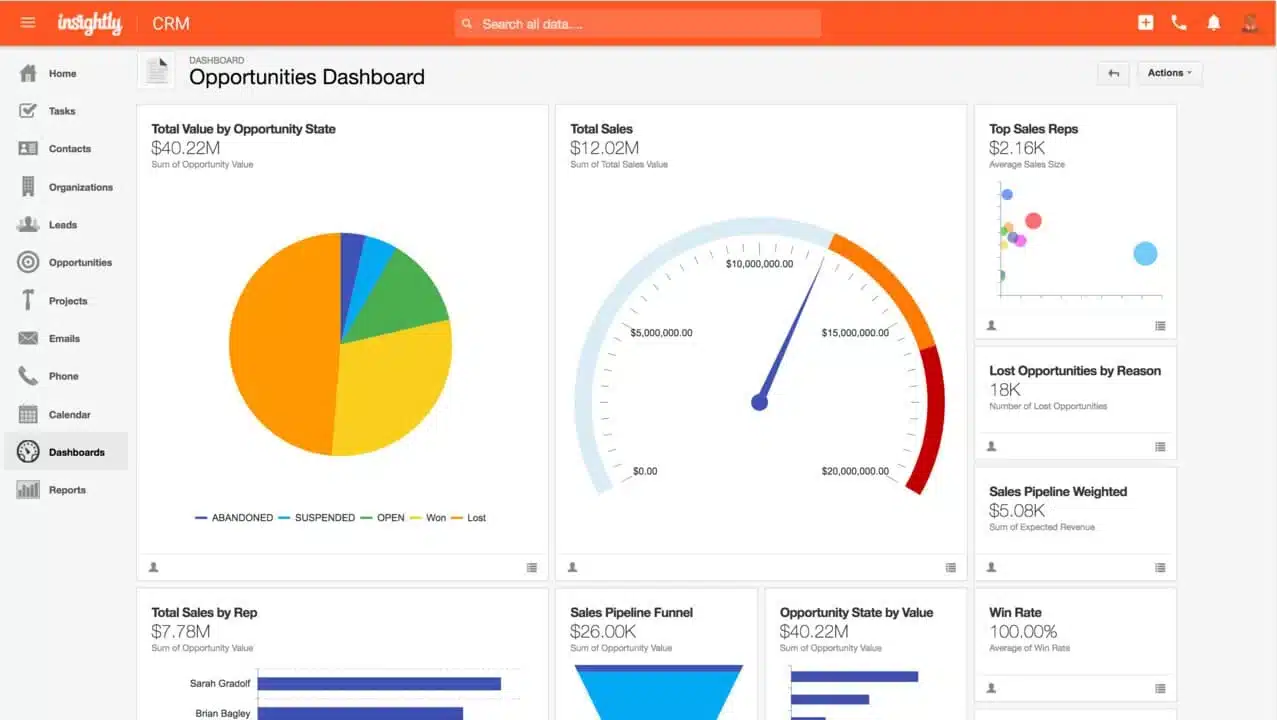
Insightly is a flexible retail CRM that works well for businesses of all sizes. It combines customer relationship management with project management tools, making it ideal for retailers to handle customer data and workflows in one place.
With Insightly, retail teams can track customer interactions, manage sales pipelines, automate routine tasks, and focus on more important, high-value activities.
Features:
- CRM and project management
- Contact management
- Task management
- Customizable dashboard
| Pros | Cons |
|
|
12. Pipefy
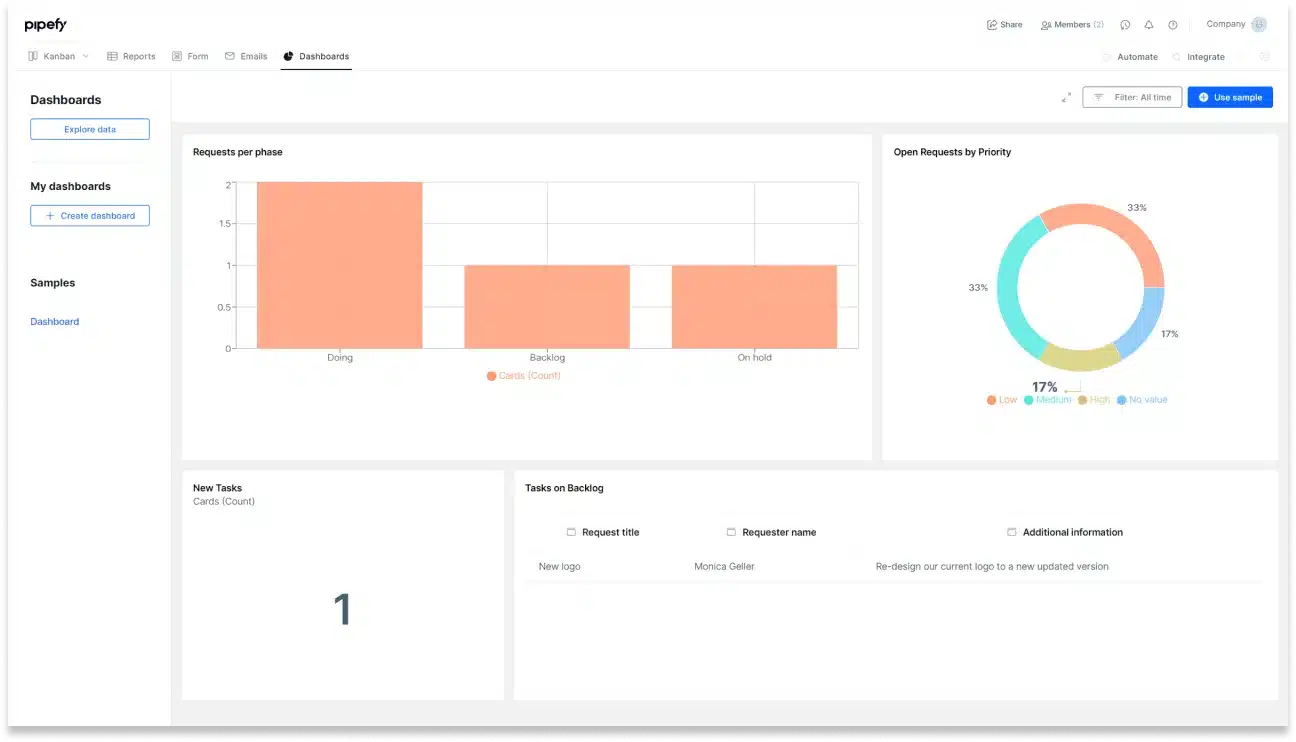
Pipefy is a workflow automation and process management tool designed to support retail business operations. Although it’s not a typical CRM, its flexibility allows retailers to organize and streamline their customer management processes.
With Pipefy, businesses can easily create customized workflows for sales, marketing, and customer support.
Features:
- Workflow automation
- Task management
- Customizable templates
- Collaboration tools
| Pros | Cons |
|
|
13. Bitrix24 CRM Retail Online
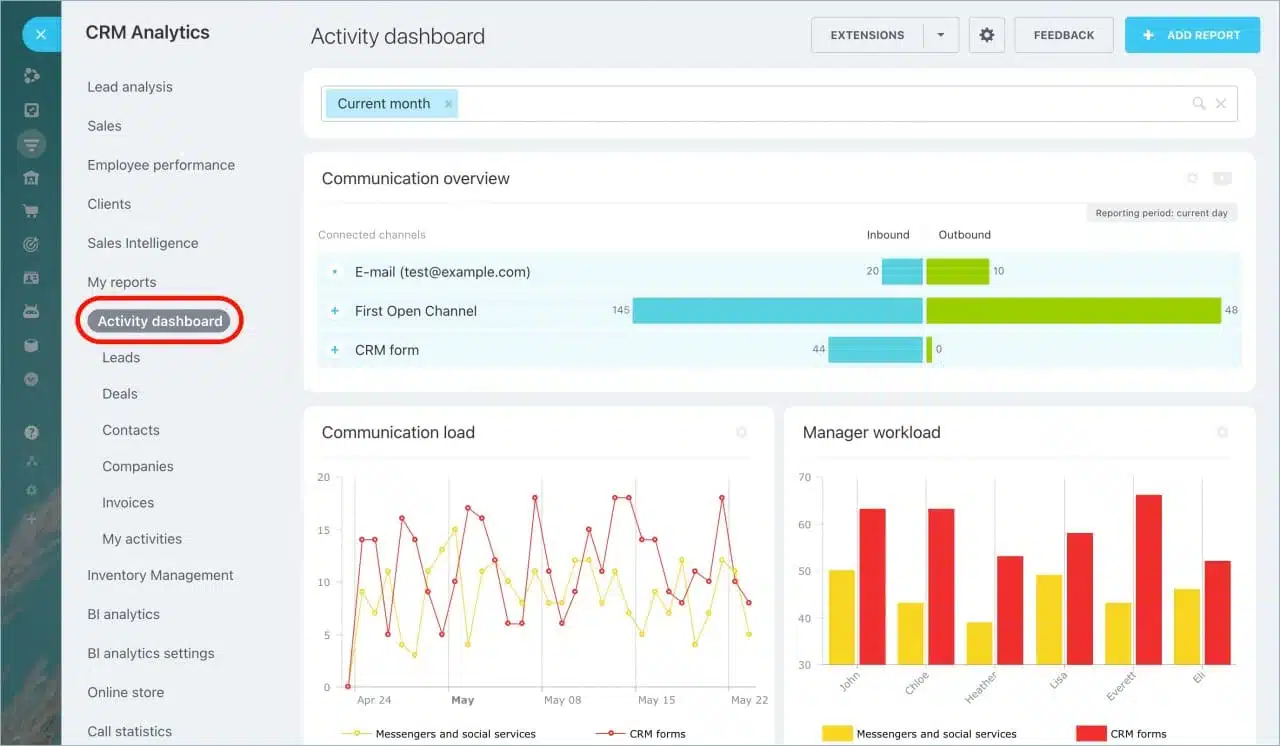
Bitrix24 is a versatile all-in-one CRM solution that’s a great fit for retail businesses. It brings together customer relationship management and essential business tools like project management, team collaboration, and communication.
With everything in one platform, Bitrix24 makes it easy for retailers to manage customer relationships and day-to-day operations seamlessly.
Features:
- CRM and project management
- Task management
- Communication tools
- Analytics and reporting
| Pros | Cons |
|
|
14. ClickUp Retail CRM Solution
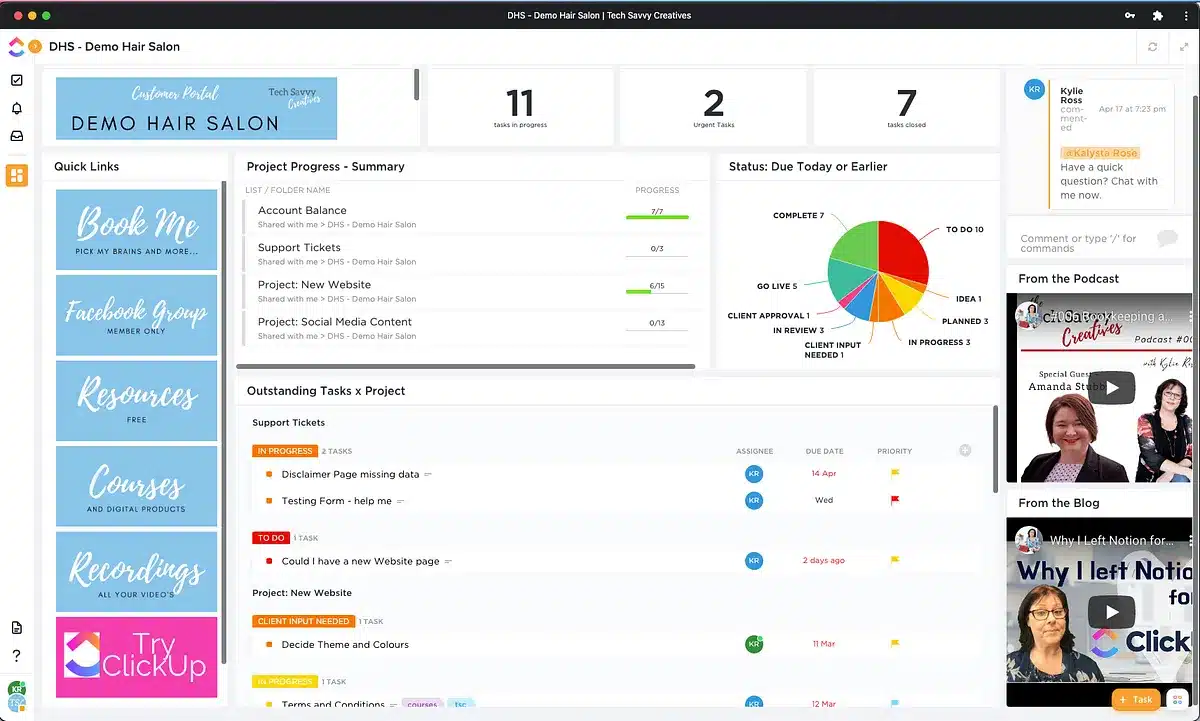
ClickUp is mainly known as a project management and productivity tool, but it can also double as a retail CRM thanks to its customizable features and flexible workflows.
While it’s not a traditional CRM, its adaptability makes it a solid option for retailers looking to manage customer data, track sales, and automate customer-related tasks all in one place.
Features:
- Task management
- Project management
- Collaboration tools
- Custom workflows
| Pros | Cons |
|
|
15. ActiveCampaign Retail CRM Software
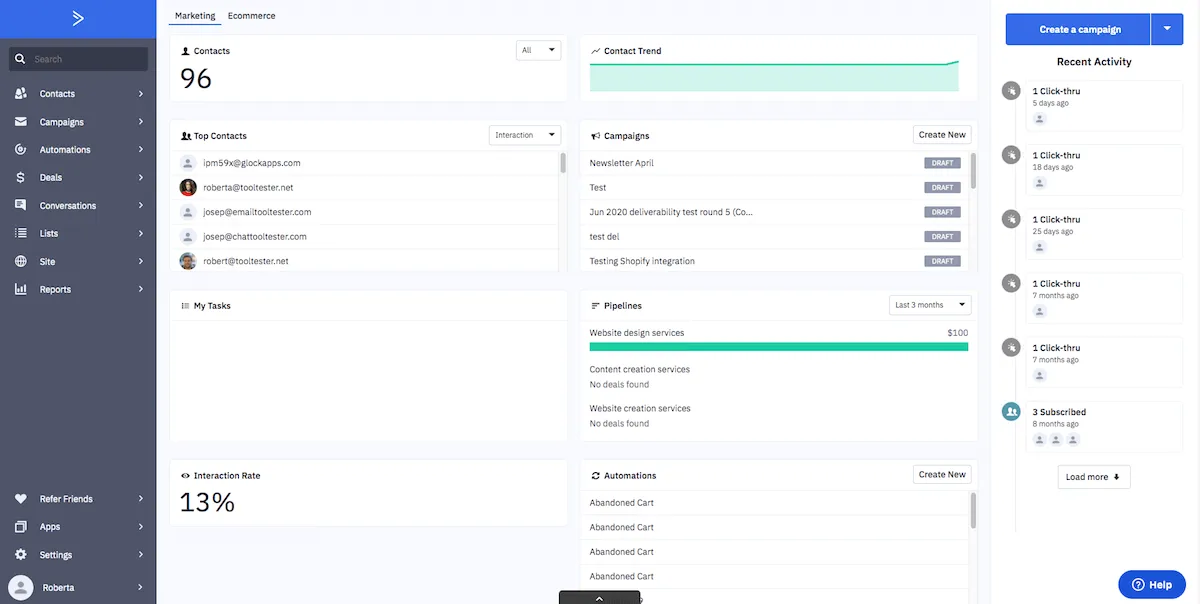
ActiveCampaign is a powerful retail CRM software that combines marketing automation with CRM features, making it a great fit for retail businesses. Its standout strength lies in automating and personalizing customer interactions on a large scale.
This is especially valuable in retail, where strong customer engagement drives repeat purchases and builds lasting brand loyalty.
Features:
- Email marketing
- CRM integration
- Automation tools
- Analytics and reporting
| Pros | Cons |
|
|
Key Features of Retail CRM Software
A good lead management software should have features that cater to the unique needs of retail businesses. These tools help manage customer relationships, boost sales, and ensure efficient operations. Here are the key features every retail CRM should offer:
- Sales and Inventory Forecasting: CRM helps predict future sales and inventory needs based on past trends, ensuring businesses maintain optimal stock levels. It can also identify slow-moving products for targeted promotions.
- Logistics Automation: Automating logistics simplifies tasks like generating shipping labels, updating tracking info, and managing returns, saving time and reducing errors.
- Store Operations Automation: CRM tools can analyze sales trends, adjust employee schedules, and create targeted marketing campaigns to improve store efficiency.
- 360° Customer View: Provides a complete view of customer interactions, including contact details, purchase history, and preferences, enabling personalized marketing and recommendations.
- Low-Code/No-Code Customization: Allows businesses to easily customize CRM features using drag-and-drop tools, like creating custom reports or designing surveys, without coding expertise.
- Reporting & Analytics: Generates reports and insights on customer behavior, helping businesses identify trends and create targeted campaigns to boost sales.
- Customer Service Management: Manages all customer service interactions across channels, ensuring inquiries are tracked, routed, and resolved quickly for better support.
Tips on Choosing Retail CRM Software
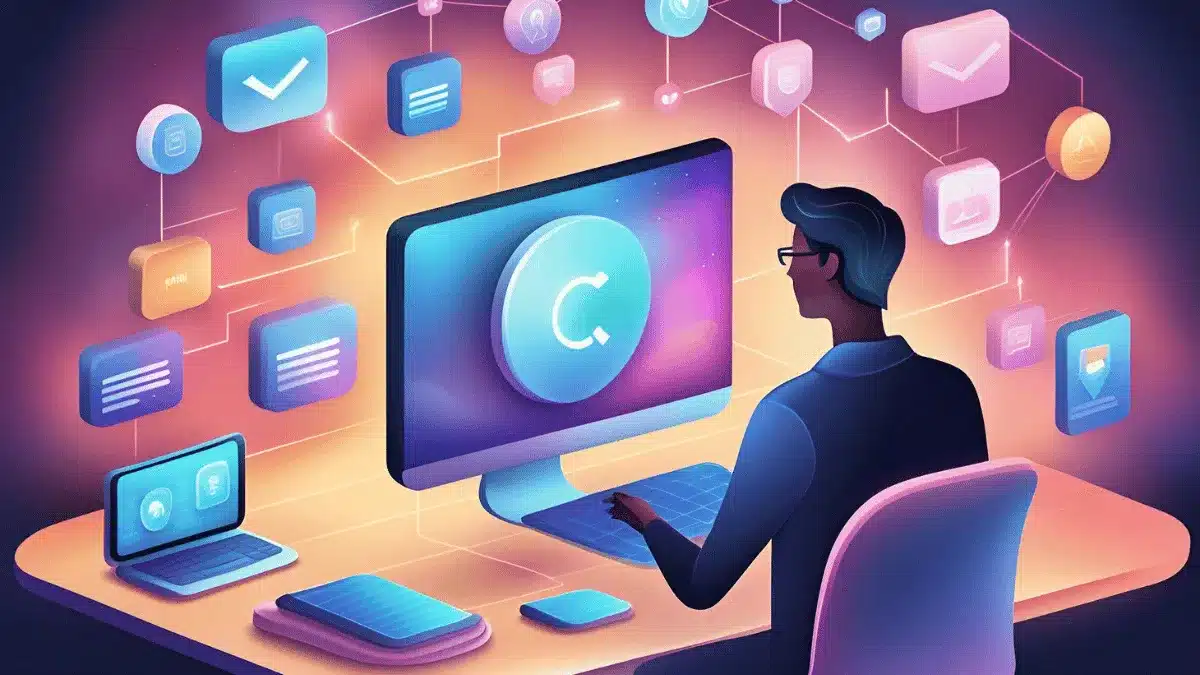
Choosing the right CRM software for retail industry is a major step toward success. Here are some best practices to help you find the ideal retail CRM solution:
1. Align CRM Strategy with Business Goals
Yes, you should consider aligning your CRM strategy with your business goals. Why? Because when everything – customer data, tasks, and interactions – is in one place, it’s way easier to see the bigger picture.
Yes, you should consider aligning your CRM strategy with your business goals. Why? Because when everything – customer data, tasks, and interactions – is in one place, it’s way easier to see the bigger picture, especially when integrated with your retail management software.
2. Order & Delivery Management
You definitely want to think about automating your order and delivery management. When your CRM handles everything from order placement to delivery, it reduces errors and ensures that orders are always on time.
3. Real-Time Monitoring
Real-time monitoring? Yes, it’s a must. Here’s why: having the ability to track inventory, sales, customer interactions, and even staff performance in real time means you can react quickly when things change.
You don’t have to wait for reports to come in; you can adjust right away. Plus, live data helps you stay ahead of the game, letting you tweak your marketing and sales strategies in response to shifts in customer behavior or demand.
4. Predictive Lead Scoring
You should look into predictive lead scoring, especially if your CRM uses AI and machine learning, as it helps you figure out which leads are most likely to become customers.
It analyzes customer behavior and past purchases to score leads, so your sales team can prioritize the ones that are ready to buy. That way, they’re not wasting time on leads that won’t convert, and they can focus on the ones who will.
5. 360-Degree View of Customers
A 360-degree view of your customers is something you shouldn’t pass up. Here’s the thing: when you have a complete picture of your customers’ behavior – whether they’re shopping in-store, online, or on mobile – you can personalize their experience.
For example, a furniture store can track a customer’s journey from browsing online to buying in-store or making a mobile purchase, giving them a tailored experience every step of the way.
6. Reporting & Analytics
You should consider using CRM reporting and analytics. Why? Because your CRM gathers tons of data, and when you use the right tools, you can turn that data into valuable insights. By tracking sales performance and identifying trends, you’ll be able to spot growth opportunities and make smarter decisions for the future.
7. Round-the-Clock Customer Support
Finally, you should definitely consider a CRM with round-the-clock customer support features. Why? Being able to manage support tickets, respond to inquiries, and keep communication flowing between your customers and support teams will make a huge difference.
Conclusion
Choosing the right retail CRM software can make a big difference for businesses in the Philippines. Sa dami ng options, it’s important to pick one that fits your needs and helps you manage customers, boost sales, and improve efficiency.
For those looking for a proven solution, HashMicro’s CRM software is an excellent choice. Its powerful features, seamless integration, and user-friendly design make it the ideal tool for solving sales challenges and enhancing overall business operations.
Huwag nang maghintay pa, subukan ang HashMicro CRM retail system today by accessing the free demo and see how it can transform your business!

FAQ on Retail CRM Online
-
What is clienteling in retail CRM?
Clienteling is a retail strategy where sales associates use data about customer preferences, behaviors, and purchases to build personalized relationships, enhancing customer loyalty and sales.
-
How does a CRM integrate with e-commerce platforms?
CRM systems often integrate with e-commerce platforms to unify customer data, track online interactions, and manage sales processes across channels, providing a seamless customer experience.
-
How can CRMretail software enhance customer loyalty?
By providing personalized interactions, tracking customer preferences, and automating targeted marketing campaigns, CRM software for retail helps build stronger relationships, leading to increased customer loyalty and repeat business.
-
What are the key features to look for in a retail CRM?
Essential features include sales and inventory forecasting, customer segmentation, real-time analytics, marketing automation, and seamless integration with existing retail systems.



